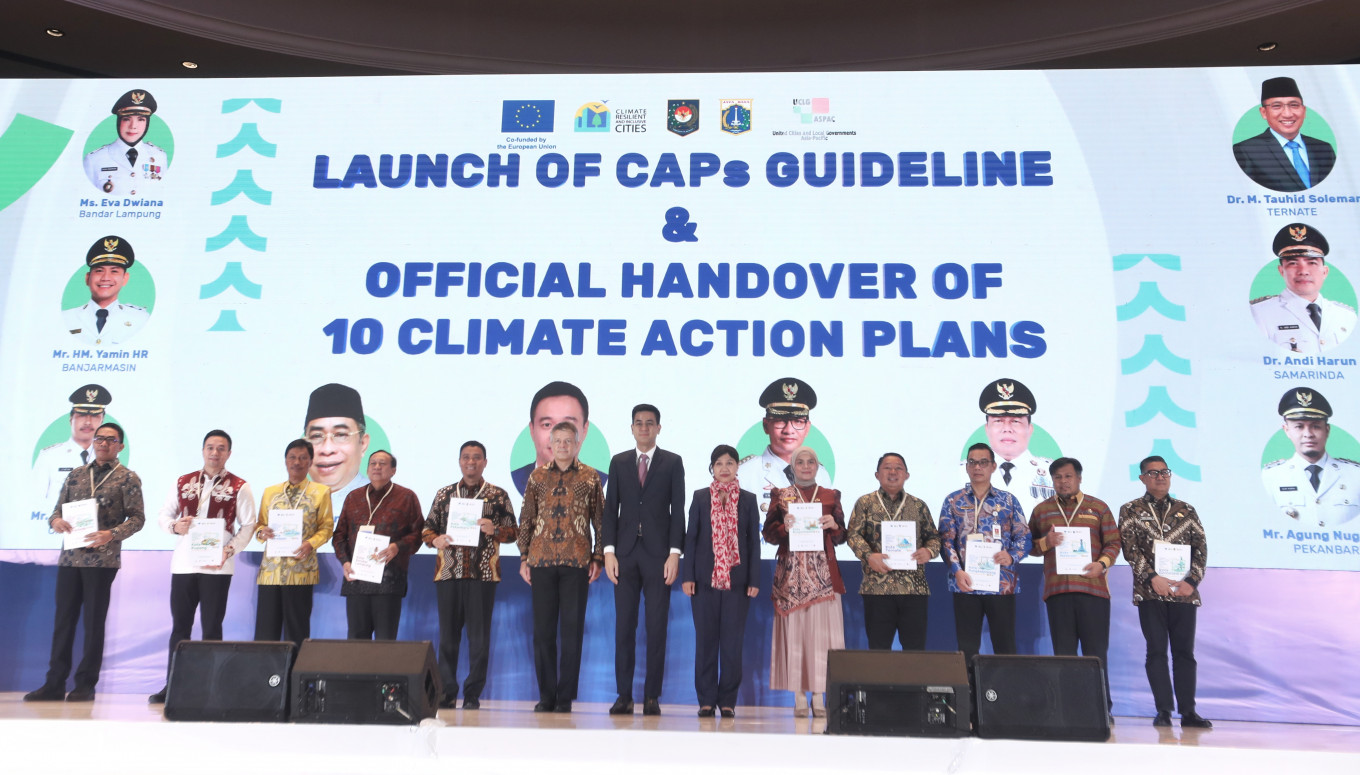Popular Reads
Top Results
Can't find what you're looking for?
View all search resultsPopular Reads
Top Results
Can't find what you're looking for?
View all search resultsTen Indonesian cities receive EU-funded climate action plans
Change text size
Gift Premium Articles
to Anyone
 European Union Ambassador to Indonesia and Brunei Darussalam Denis Chaibi (center left), the United Cities and Local Governments of Asia- Pacific (UCLG ASPAC) Dakila Carlo E. Cua (center) and UCLG ASPAC Secretary-General Bernadia Irawati Tjandradewi are flanked on Wednesday by mayors from 10 Indonesian cities receiving Climate Action Plans (CAP) in Jakarta. The handover was held during the Climate Resilience and Innovation Forum (CRIF) organized by UCLG ASPAC in cooperation with Jakarta city administration and the EU.
(Courtesy of UCLG ASPAC/-)
European Union Ambassador to Indonesia and Brunei Darussalam Denis Chaibi (center left), the United Cities and Local Governments of Asia- Pacific (UCLG ASPAC) Dakila Carlo E. Cua (center) and UCLG ASPAC Secretary-General Bernadia Irawati Tjandradewi are flanked on Wednesday by mayors from 10 Indonesian cities receiving Climate Action Plans (CAP) in Jakarta. The handover was held during the Climate Resilience and Innovation Forum (CRIF) organized by UCLG ASPAC in cooperation with Jakarta city administration and the EU.
(Courtesy of UCLG ASPAC/-)
T
en cities in Indonesia received Climate Action Plans (CAP) to mark the completion of the Climate Resilient and Inclusive Cities (CRIC) program on Wednesday, which was funded by the European Union.
The cities receiving the CAPs were Bandar Lampung, Cirebon, Samarinda, Pekanbaru, Banjarmasin, Pangkalpinang, Gorontalo, Kupang, Mataram and Ternate.
The CAP handover was held during the Climate Resilience and Innovation Forum (CRIF) 2025, which was organized by the United Cities and Local Governments Asia Pacific (UCLG ASPAC) in cooperation with Jakarta city administration and supported by the EU, the organizer said in a press release.
The CAPs will guide the cities to integrate inclusive climate strategies into their mid-term development plans.
CAP guidance was also launched, which was prepared based on the UCLG ASPAC’s experiences and lessons learned in helping more than 20 regional administrations in the Asia Pacific region draft their CAPs.
The forum gathered more than 300 participants from Indonesian city and regional administrations, together with partners from Asia, the Pacific and Europe to discuss urban climate resilience issues.
With the theme “Empowering Cities and Local Governments for a Climate-Resilient Future”, the forum emphasized the importance of local and regional leadership and climate resilience.
UCLG ASPAC secretary-general Bernadia Irawati Tjandradewi opened the forum by saying a community was needed for climate action mainstreaming.
“This can start by building awareness of crises and increasing the knowledge, outlook and courage of stakeholders in pilot cities to plan and implement climate actions,” she said, as quoted by the press release.
She said that creating sustainable climate actions requires building sustainable global urban partnerships that support finance and technology.
Meanwhile, EU Ambassador to Indonesia and Brunei Darussalam Denis Chaibi said that tackling climate change was still a main priority for the EU.
“Climate change affects each city in a different way, depending on vulnerability, readiness and mitigation capabilities,” he told the forum.
“Through the CRIC project, the EU and Indonesia work together to create better inclusivity in their cities, so they become stronger in facing climate change.”
Representing the Indonesian home minister was Director General for Regional Administration Syafrizal ZA, who said that Indonesia was highly committed to climate change issues, as prioritized in the National Long Term Development Plan (RPJPN) and Regional Long Term Development Plan (RPJPD).
He said that mayors and regents were helpful in working toward climate resilience, with the ministry’s programs focused on pollution control, biodiversity management and waste management.
Several cooperation agreements were signed, such as between Samarinda and Hefei, UCLG ASPAC and Kuala Lumpur and UCLG ASPAC and the National Association of Local Authorities of Georgia (NALAG).
During the forum, several cities in southeast Asia received Global Covenant of Mayors (GCoM) badges for having shown real progress in climate action.
The forum also introduced the UCLG ASPAC City and Local Government Institute, which will serve as a research and knowledge center to push for evidence-based policy, research and knowledge management.









